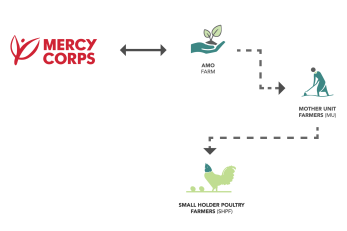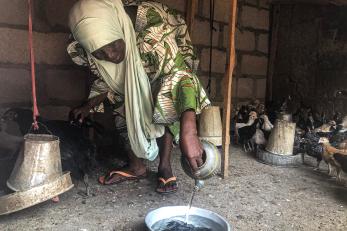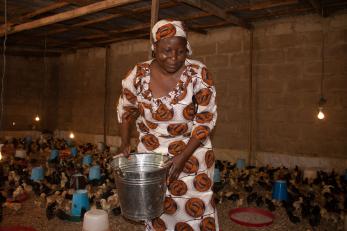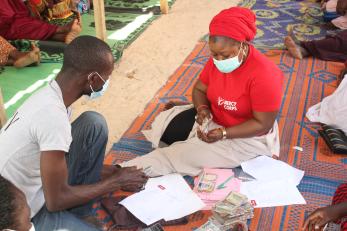Revitalizing local poultry market systems in Borno state
Introduction
The food insecurity in the Northeast region of Nigeria is worsening, with approximately 3.5 million people projected to be currently food insecure in the three worst-affected states, Borno, Adamawa and Yobe states. This is in addition to conflict-induced displacement, loss of livelihoods, breakdown of the market systems and high insecurity experienced by many agrarian communities in this region. However, since 2015, 1.6 million people have returned to or are closer to their homes and attempted to begin to rebuild their lives.
In a bid to aid vulnerable returnees in rebuilding their poultry livelihoods and markets in Borno state, Mercy Corps’ Poultry Development for Resettlement (PDR) program utilized a market systems approach to support existing and new poultry farmers to rear and sell noiler chickens (a dual-purpose, disease tolerant and low-maintenance breed) as a viable source of income and means of nutrition.
About PDR
Mercy Corps is implementing the Poultry Development for Resettlement (PDR), a three-year program with a $1,400,000 budget funded by Bill and Melinda Gates Foundation which aims to provide a viable source of income to vulnerable households, especially women, by revitalizing the poultry market systems in Borno state, Nigeria.
Since its launch in October 2017, Mercy Corps partnered with Amo Farms Sieberer Hatchery Ltd (also known as AMO Farms) to test the hypothesis that poultry is a good livelihood for early recovery; contributing to household income, food security and nutrition. We work in Biu, Maiduguri, Gwoza, Damboa, Jere and Dikwa in Borno state.
Amo Farms Ltd is a lead private sector poultry farm and the sole producer of the noiler chicken in Nigeria. Noiler is a hybrid of the native, broiler and Layer chicken, an innovation in poultry which adapts in harsh climates and scavenges for food on its own, making it cost effective for local farmers to breed.
Design/Approach
Mercy Corps leverages on our global expertise in fostering resilience and building market systems in complex environments. We aim to show the possibility of scaling up locally driven livelihoods by collaborating with the private sector through firm-led initiatives.
This is why PDR forged a partnership with AMO farm because a critical component of this program is the establishment of Mother Units. Mother Units are poultry entrepreneurs responsible for stocking up on day-old noilers and brood for 5 weeks, from which smallholder poultry farmers off-take at five weeks and as well get their supplies. We are utilizing this model because it reduces the risk of mortality that occurs during transit of day-old-chicks from the hatchery and also during the brooding period to rural smallholder poultry farmer communities. The day-old-chicks are delivered to the Mother Units, who then commercially grow them for five weeks before selling them to smallholder poultry farmers for further rearing. This reduces the risks associated with cost of production of poultry birds when they are most susceptible to diseases and mortality for small-holder poultry farmers.
Mercy Corps assists vulnerable households to start a safe income generating activity focused on poultry livelihoods while stimulating systemic changes in poultry markets systems in Borno State. Unlike the capital intensive investments required in rearing larger livestock, poultry rearing places relatively little economic strain on households. This makes it affordable by allowing vulnerable households to start producing chickens with only a limited input from Mercy Corps in the form of training and chickens for rearing and/or egg-laying.
Market systems flowchart

Implementation
Mercy Corps sought to develop the poultry market in eight (MMC, Jere, Biu, Hawul, Kwaya Kusar, Damboa, Dikwa and Gwoza) local government areas in Central and Southern Borno. Findings from a PDR midline survey revealed that in the context of Borno State, poultry farming, specifically of the noiler breed, is indeed a beneficial early-recovery activity. The spillover benefits included reinvestment in additional livelihoods, growth of local markets, including jobs, for poultry inputs and supply of chickens, and strengthening social networks through smallholder poultry farmer groups. These are some of the key benefits PDR recorded in its three-year period of implementation.
- Revitalizing local chicken and egg markets through the introduction of chickens which are disease tolerant and highly productive.
The program was able to reach 1,585 poultry farmers who started noiler production as a new livelihood through smart subsidy and vouchers. This led to over 2,000 poultry farmers that were not target participants investing in poultry business as well.

When Zainab was introduced to poultry farming by Mercy Corps and made a lot of profit it motivated her to influence other women in her community to get involved in the poultry rearing business.
“During the AMO farms promotion, I bought 10 chicks and got 10 for free with a 25 kg bag of chicken feed. When I eventually sold them I couldn’t believe the profit I made. I have been able to convince about 14 people so far to start this business and I still have many more people I plan on introducing it to,” Zainab shares.
- Stimulating local investment in businesses supplying highly demanded goods and services (chicks, quality poultry feed, poultry advisory services).
As a result of the linkage PDR established between Mother Units and AMO Farms Ltd., Mother Units could directly purchase noiler chicks, had access to poultry management training and advisory services from AMO farms. So far, 27 Mother Units have been trained on poultry management and 22 potential Mother Units were trained. Through the three-year span of the PDR program, 15 Mother Units re-invested in 16 cycles and nine Mother Units in deep field sites (Dikwa, Damboa and Gwoza) invested in only two cycles due to the insecurity and COVID‑19 restrictions on movement nationwide.
Rahila Daniels is one of Mother Units PDR linked to AMO farms, she was supplied with noiler chicks and trained on poultry management. Although she started the Mother Unit at the beginning of 2020, within a short period of time she was able to double her monthly savings and expand her brooding space due to the income she gained from selling noilers to smallholder poultry farmers in Biu, where she lives. In her words, “This business has given me a name and I can now provide for my family. I started with 800 day old chicks, but now I have expanded my brooding space and can brood up to 5,000 day-old chicks. "

- Creating opportunities for vulnerable households to engage in a safe, fast returning, and income generating activity (poultry rearing) and Village Savings and Loans Association (VSLA) groups.
All participants registered under the PDR program were mandated to belong to a VSLA group in their community. Then the VSLA groups underwent training on the VSLA methodology and were supported to register their VSLA group as a cooperative under Borno state government which would make them eligible for grants and loans from financial institutions. As a result, 61 VSLA groups were formed, which comprises a total of 3,015 Members (2,789 females and 226 males). In a study conducted by Mercy Corps Nigeria Internal Research and Learning team, they found strong use for savings groups by women, as these groups provide support to members during times of shock such as medical emergencies or social events such as weddings and funerals.

Increasing household availability and access to nutrient-dense and affordable food; chicken meat and eggs. Many poultry farmers attested to how beneficial it was to have easy access to chickens and eggs especially when they experienced food shortages. According to the midline survey of the PDR program, the daily consumption of animal based proteins has increased by 8% among program participants’ households.
Opportunities for expansion
The PDR program pilot was able explore how the scale-up of market-based approaches driven by private sector manufacturers is a viable means for supporting vulnerable populations in conflict affected areas to transition from humanitarian support to market-led early recovery and economic development.
One key takeaway from implementation is that rural entrepreneurs are looking for business opportunities that require low start-up costs and attract high-profits per production cycle. This highlights the significance of the program’s decision to use the noiler breed because it does not require added inputs and is mostly disease tolerant while high producing.
There is an opportunity to expand the use of poultry (noiler)-based livelihoods for early recovery of conflict-affected populations as it has the potential to strengthen households ability to cope with shocks and stresses, improve their nutrition and access to sustainable income.